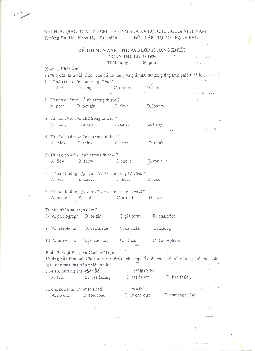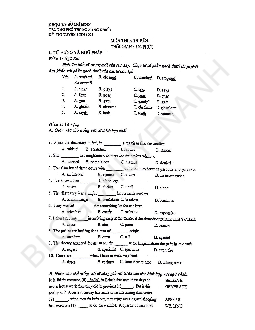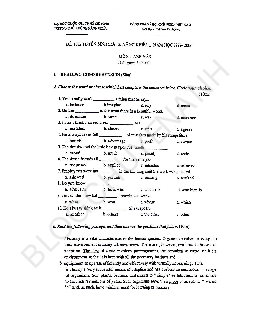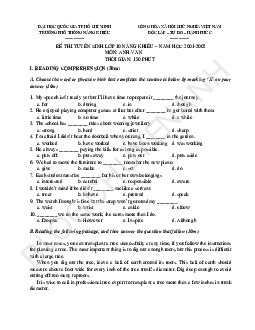




Preview text:
ĐỀ QUẢNG NGÃI
PART A. PRONUNCIATION (1.0 pt)
Choose the word that has the underlined letter(s) pronounced differently from the others.
1. A. rebuilds B. destroys. C. occurs D. prevents A. /ˌriːˈbɪldz/ B. /dɪˈstrɔɪz/ C. /əˈkɜː(r)z/ D. /prɪˈvents/ 2. A. stopped B. looked C. watched D. opened A. /stɑːpt/ B. /lʊkt/ C. /wɑːtʃt/ D. /ˈəʊpənd/ 3. A. environment B. pol ution C. deforestation D. provide A. /ɪnˈvaɪrənmənt/ B. /pəˈluːʃn/ C. /ˌdiːˌfɒrɪˈsteɪʃn/ D. /prəˈvaɪd/ 4. A. champagne B. chemical C. mechanic D. scholarship A. /ʃæmˈpeɪn/ B. /ˈkemɪkl/ C. /məˈkænɪk/ D. /ˈskɒləʃɪp/ 5. A. spread B. great C. healthy D. pleasure A. /spred/ B. /ɡreɪt/ C. /ˈhelθi/ D. /ˈpleʒə(r)/
PART B. STRUCTURES AND VOCABULARY (2.0 pts)
Section I. Choose the letter A, B, c, or D to indicate the correct answer to each of
the following questions. (1.5pts) 6. He
with his friends in an apartment in Ho Chi Minh city since last week. A. living B. lived C. has lived D. live
● Hành động xảy ra trong quá khứ và kéo dài liên tục đến hiện tại ( dấu hiệu “since”) --> HTHT 7. My brother
a representative of his company when he was young. A. used be B. used to be C. to be D. be ● used to + V0: đã từng
8. There are usually a lot of parties New Year’s Eve. A. on B. in C. at D. about
● on New Year’s Eve: vào đêm giao thừa (dương lịch) 9. Tet is a
which occurs in late January or early February. A. meeting B. festival C. party D. activity
● meeting /ˈmiːtɪŋ/ (n): cuộc gặp gỡ
● festival /ˈfestɪvl/ (n): lễ hội
● party /ˈpɑːti/ (n): tiệc
● activity /ækˈtɪvəti/ (n): hoạt động 10. The picture
I bought yesterday was very valuable. A. whom B. who C. which D. whose
● Mệnh đề quan hệ “which” thay thế cho “the picture”
11. Earthquakes, volcano eruptions, tidal waves, tornadoes are natural . A. happenings B. occurrence C. events D. disasters
natural disaster /ˈnætʃrəl/ /dɪˈzæstər/: thảm họa thiên nhiên 12. I suggest that your sister some money for poor children. A. to raise B. raises C. raising D. should raise
Câu đề nghị: S + suggest (that) + S + should + V0 13. Students wil need
guidance on their choice of future jobs. A. care B. careful C. careful y D. careless adj + N
care /keə(r)/ (n): sự chăm sóc
careful /ˈkeəfl/ (adj): cẩn thận
careful y /ˈkeəfəli/ (adv): 1 cách cẩn thận
careless /ˈkeələs/ (adj): không để ý 14. English in many parts of the world. A. is spoken B. are spoken C. speaks D. is speaking
Cấu trúc câu bị động: S + be (chia) + V3/ed + by S.O 15.
If it doesn’t rain heavily, we to the beach tomorrow. A. would go B. wil go C. could go D. would have to go
Câu điều kiện loại 1: If + S + V(s/es), S + wil /can/shal + V0 16. Are you interested _ art and music? A. on B. with C. about D. in
be interested in + N/V-ing: thích thú về điều gì/việc gì 17. My car broke down on the way.
, when I got to the airport, the plane had taken off. A. However B. Although C. In addition to D. Therefore However: tuy nhiên Although: mặc dù
In addition to: thêm vào đó Therefore: do đó 18. Would you mind turning
the lights please? It’s too dark for me to read. A. off B. on C. up D. down Turn on: bật
19. These students never go to school by motorbike, ? A. do they B. do these students C. don’t they D. are they
Câu hỏi đuôi: động từ chính “go” và phủ định “never” --> do they 20. My brother is fond of stamps. A. collecting B. collect C. collected D. collects
be fond of + V-ing: thích cái gì
Section II. Complete each sentence with an appropriate form of the word in brackets. (0.5 pt) 21.
We had a discussion about effective ways of learning English yesterday. (DISCUSS)
discuss /dɪˈskʌs/ (v): thảo luận
discussion /dɪˈskʌʃn/ (n): sự thảo luận have a discussion about 22.
The boss will get very angry if someone disagrees with his ideas. He wants all his ideas to be approved of. (AGREE)
agree /əˈɡriː/ (v): đồng ý
disagree /ˌdɪsəˈɡriː/ (v): không đồng ý
Câu điều kiện loại 1: If + S + V(s/es), S + will/can/shall + V0 23.
The shoes are nice but they are uncomfortable (COMFORT)
comfort /ˈkʌmfət/ (n): sự thoải mái
uncomfortable /ʌnˈkʌmfətəbl/ (adj): bất tiện 24.
They walked too slowly to catch the bus. (SLOW) slow /sləʊ/ (adj): chậm
slowly /ˈsləʊli/ (adv): 1 cách chậm chạp
Trạng từ bổ nghĩa cho động từ thường 25.
Our family went to see most of the interesting Places in Ha Noi last month. (INTEREST)
interest /ˈɪntrest/ (n): sự quan tâm
interesting /ˈɪntrestɪŋ/ (adj): thú vị
PART C. READING COMPREHENSION (4.0 pts)
Section I. Fill in each gap with a suitable word provided in the box. (1.6 pts)
Today, computer companies sel many different programs for computers. First, there are programs for
doing math problems. Second, there are programs (26) for scientific studies. Third, some programs
are like fancy typewriters. They are often used by writers and business people. Other programs (27)
are made for courses in schools and universities. And final y, there are programs for fun. They
include word games and puzzles for children and (28) adults.
There are many wonderful new computer programs, but there are other reasons to like (29) computers. Some
people like the way computers hum and sing when they are (30) working. It is a happy sound, like the sounds
of toys and childhood. Computers also (31) have lights and pretty pictures. And computers even seem to
have personalities. That may (32) sound strange, but computers seem to have feelings. Sometimes they
seem happy, sometimes they seem (33) angry. It is easy to think they are like people. (32) sound + adj: có vẻ
(33) seem + adj: dường như, có vẻ
Section II. Read the following passage and choose the word or phrase (A, B, C or D) which best completes
each blank in the following passage. (1.4 pts)
In Britain, greetings cards are sold in chain stores and supermarkets, in newsagents’ shops, corner shops and,
increasingly, in shops (34) ____ specialize in the sale of cards and paper for wrapping presents in. The most
common cards are birthday and Christmas cards. Many Christmas cards are sold in aid of charity and special
‘charity card shops’ are often set (35) _____
in temporary premises in the weeks before Christmas. (36)____
wide variety of birthday cards is available to cater for different ages and tastes. Some, especially ones for young
children or for people (37) ______
a particular birthday, have the person’s age on the front. Many have
comic, often risqué, messages printed on them, and cartoon-style illustrations. Others are more sober, with
reproductions of famous paintings or attractive original designs. The usual greeting on a birthday card is ‘Happy
Birthday’, ‘Many Happy Returns’ or ‘Best Wishes for a Happy Birthday’. Some people also send special cards for
Easter and New Year. Easter cards either portray images of spring, such as chicks, eggs, lambs, spring flowers,
etc, (38)____have a religious theme. Cards are produced for every ‘milestone’ in a person’s life. There are special
cards for an engagement, a marriage, a new home, a birth, (39)______ in an examination, retirement, a death in
the family, etc. Some are ‘good luck’ or ‘congratulations’ cards. (40) ______, for example ‘get well’ cards for
people who are ill, express sympathy. 34. A. that B. where C. who D. why Đại từ quan hệ:
‘that’ Làm chủ ngữ hoặc tân ngữ, thay cho cả danh từ chỉ người và danh từ chỉ vật. (trước ‘that’ không có dấu phẩy)
‘who’ Làm chủ ngữ hoặc tân ngữ, thay thế cho danh từ chỉ người. Trạng từ quan hệ:
‘where’ Đại diện cho từ hoặc cụm từ chỉ nơi chốn.
‘why’ Đại diện cho từ hoặc cụm từ chỉ lý do. 35. A. on B. up C. in D. of
Set up (phrasal verb): thiết lập 36. A. An B. The C. A D. Some
A variety of: nhiều, đa dạng 37. A. celebrating B. celebrate C. celebrated D. celebration
Rút gọn mệnh đề quan hệ, ta lược bỏ đại từ quan hệ và lược bỏ trợ động từ to be (nếu có), sau đó
chuyển động từ chính sang dạng V-ing. 38. A. nor B. but C. and D. or Either…or: hoặc….hoặc 39. A. success B. succeed C. successful D. unsuccessful
Ở vị trí này ta cần một danh từ (vì câu đang liệt kê 1 loạt từ loại đều là danh từ)
success /səkˈses/ (n): sự thành công
succeed /səkˈsiːd/ (v): thành công
successful /səkˈsesfl/ (adj): thành công
unsuccessful /ˌʌnsəkˈsesfl/ (adj): không thành công 40. A. Another B. Others C. Other D. Much Others: những thứ khác
Section III. Read the passage and answer the following questions. (1.0 pt)
Have you ever noticed advertisements which says “Learn a foreign language in 6 weeks, or
your money back. From the first day your pronunciation wil be excel ent. Just send…” and so
on? Of course, it never happens quite like that. One’s mother language is easier to learn, but it
also requires a lot of practice to be fluent. And think how much practice that gets! Before the
Second World War, people usual y learned a foreign language in order to read the literature of the country.
Now speaking a foreign language is what most people want. Every year mil ions of
people start learning one. How they do it? Some people try it at home, with books and records
of tapes; some use radio or television programmes; some use computers and network; others
go to evening classes. If they use the language only 2 or 3 times a week, it wil take a long time,
like learning a foreign language at school. A few people try to learn a language fast by
studying for 6 or more hours a day. It is clearly easier to learn the language in the country
where it is spoken. However, most people cannot afford this, and for many it is not necessary.
They need the language in order to do their work better. For example, scientists and doctors
chiefly need to be able to read books and reports in the foreign language. Whether the
language is learned quickly or slowly, it is hard work. Machines and good books wil help, but
they cannot do the students’ work for him.
41. Are advertisements for the English courses completely true? No, they aren’t
KEY: ……. it never happens quite like that
42. According to the passage, what language is easy to learn?
Mother tongue is easy to learn.
KEY: One’s mother language is easier to learn
Mother tongue /ˌmʌðə ˈtʌŋ/ (n): tiếng mẹ đẻ
43. Do people learn a foreign language in the same way or in different ways? People learn a foreign language in different ways.
KEY: Some people try it at home, with books and records of tapes; some use radio or
television programmes; some use computers and network; others go to evening classes.
44. What does “this” in paragraph 2 refer to?
“this” in paragraph 2 refer to “ learning the language in
the country where it is spoken”.
KEY: It is clearly easier to learn the language in the country where it is spoken. However,
most people cannot afford this
45. According to the passage, why is the foreign language necessary for people now? They need the
foreign language in order to do their work better.
KEY: They need the language in order to do their work better.
PART D. WRITING ( 3.0 pts)
Section I. Finish each of the following sentences in such a way that it is as similar as
possible in meaning to the sentence printed before it. (2.0 pts)
46. Mary doesn’t know how to make the cake.
Mary wishes she knew how to make the cake.
Câu ước (ở hiện tại): S + wish(es) + (that) + S + V-ed/were/p2
47. No one has used this machine for years.
This machine hasn’t been used for years.
Thì HTHT dùng để diễn tả một trải nghiệm
48. She is the famous singer. Her sister looks after our baby.
She is the famous singer whose sister looks after our baby.
Mệnh đề quan hệ “whose sister” thay thế cho “her sister”
49. They asked me: “Do you like music?”
They asked me if/whether I liked music.
S+ask(ed) O+ if/whether + mệnh đề ( lùi thì)
50. It is five years since I last saw my cousin.
I haven’t seen my cousin for five years.
Thì HTHT dùng để diễn tả một hành động, sự việc đã bắt đầu từ trong quá khứ, kéo dài đến
hiện tại và có thể tiếp tục tiếp diễn trong tương lai.
51. Although he didn’t finish his work, he went to bed early.
In spite of not finishing his work, he went to bed early.
Although + clause = In spite of + noun : mặc dù
52. The black dress is more expensive than the while one.
The white dress isn’t as/so expensive as the black one.
So sánh bằng: as + ADJ/ADV + as hoặc so + ADJ/ADV + as
53. I can’t show you the way to the nearest hospital because I don’t have a map.
If I had a map, I could show you the way to the nearest hospital.
Câu điều kiện loại 2: If + S + V-ed, S + would/could/... + V
Sử dụng để diễn tả những tình huống không có thật, không thể xảy ra trong tương lai và giả
định kết quả nếu nó có thể xảy ra.
54. Lan was given a gift on her birthday, so she was happy.
Lan was happy because she was given a gift on her birthday.
Ngày sinh nhật được Lan tặng quà nên cô rất vui
Lan rất vui vì được tặng quà trong ngày sinh nhật.
55.1would rather read books than play video games.
I prefer reading books to playing video games.
S + would rather (not)+ N / V0 + than +… : thích cái gì hơn = prefer + V-ing




